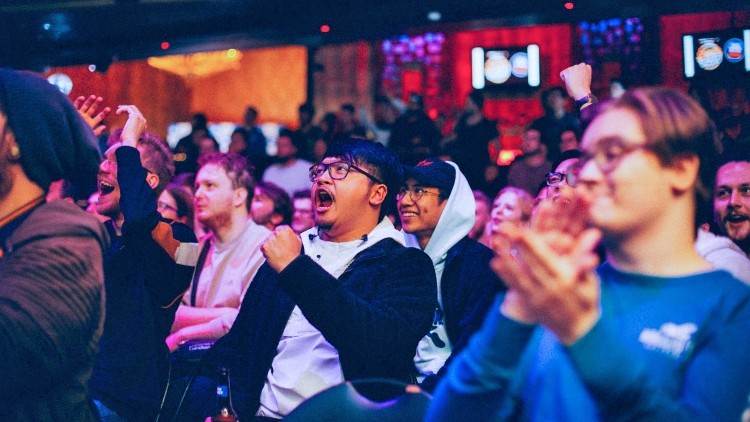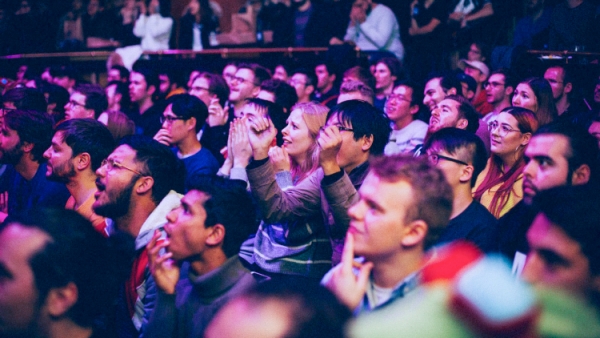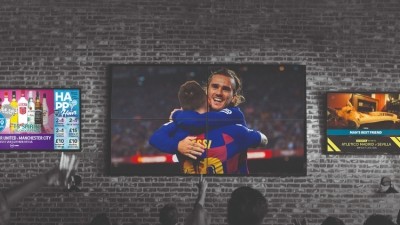‘Sociable’ esports communities can boost pub trading

Founded as a pet project by a group of esports enthusiasts within the beer industry, mylocalesportsbar – which works with pubs and bars across the UK to host esports viewing parties and streaming events – believes in a big future for gaming as a spectator sport in Britain’s pubs.
It’s easy to see why they’re getting excited. Industry analysts Newzoo found esports’ global audience hit 443m in 2019 – a 12.3% year-on-year increase – and is expected to grow to 495m and generate £1bn in global revenue next year.
“Mylocalesportsbar started as a conversation between a bunch of esports fans who were streaming at home but found that the in-home experience missed the social aspect of watching with a larger group – or even interacting with strangers,” Michael Codd, digital marketing and innovation lead, Europe, at Budweiser Brewing Group, and mylocalesportsbar co-founder, explains.
“We looked at other companies that connect sports fans and drive them to pubs and asked why we wouldn’t do the same thing for esports? I find that a lot of things that work with traditional sports work for esports. It’s quite a natural progression.”
Premier prediction
Yet, around a year after launching, Codd and mylocalesportsbar’s co-founders have made a lofty prediction that in five years’ time, watching esports in a pub will be as normal as taking in a Premier League clash there.
Despite eye-watering industry growth and research conducted in tandem with MatchPint revealing that current esport streaming events can see average sales of $1,400 (£1,085) versus $1,500 (£1,163) for a Premier League match – surely the idea that watching world’s best gamers strut their stuff on shoot ’em up Call of Duty or online battle arena League of Legends could become as commonplace in the pub trade as someone sinking a few pints in front of the football is eternally optimistic?
Yet, citing the attraction of a highly engaged audience of millions of fans to massive global brands – including a few Premier League teams who have splashed the cash on launching esports teams and recruiting top gaming talent – Codd sticks to his digital guns.
“We’re seeing esports sponsorships coming from big car brands like Audi and BMW; from big telecoms companies; and the likes of McDonald’s, PayPal and Coca-Cola,” he explains.
“A lot of big brands are investing and with that investment comes scale and outreach.”
Common misconceptions
When asked what he would say to reassure pub operators concerned that esports will drive away its more traditional customer base in favour of age groups that studies show are drinking less, Codd explains that anyone pinning nerdy stereotypes to esports fans are getting the wrong end of the joystick.
“There are pretty common misconceptions around the age group of esports enthusiasts,” he says. “We’re seeing that the average age is between 25 and 30.
“A lot of the playing population is a bit younger but they’re not necessarily the ones that really like to watch. I feel the target audience typically likes to go to the pub and enjoy a drink.”
Codd cites mylocalesportsbar’s recent screening the League of Legends world final at the Clapham Grand, London, on 10 November as a prime example of this. The event, which was watched by 100m viewers worldwide via online streams, attracted more than 500 esports enthusiasts to the south London venue, generating £4,800 in sales – 77% of which were from alcoholic drinks (59% from beer and 18% from cocktails).
“It’s a very social community online but people have the impression that this audience isn’t sociable because what they do is online,” Codd adds.
“What I’d argue is that they are even more social because they form tightknit online communities and enjoy something they’re really passionate about together with a sky-high level of engagement. Taking that from an in-home experience to an out of home pub setting is quite a natural progression.”
Scheduling ‘pain-point’
However, while potentially lucrative esports tournaments are free for pubs to stream from platforms such as Twitch and YouTube – provided operators have a smart TV or access to the internet through their TV via a computer and HDMI cable – Codd acknowledges that it’s currently difficult to keep tabs on everything that is happening. Crucially for the on-trade, this means that organising events around online streams can be tricky.
“One of the biggest pain-points of this industry is finding a reliable calendar source,” he says. “The reason why it’s hard to find is because the industry is yet to mature. There’s no reliable aggregator of the hundreds of games out there that knows which games are popular and puts that into one channel for you to access.
“At the moment, you’re dealing with having to access many different data sources to find out when stuff if happening, but at the same time getting quite short notice as to when the games will take place.”
Press start
In Codd’s experience, while there has been fairly limited overlap between esports enthusiasts and traditional sport fans in recent years – making it difficult for pubs to create social spaces for them to co-habit – the similarity in tech needed for both has led to more venues trying to move into esports streaming.
“I’ve not seen any pubs that have been able to mix being a traditional sports bar with reaching out to the esports audience and do it well,” he says. “But it’s something I’m seeing more people in the industry try. The set-up is already there, they already have everything they need, they just need to find the audience to come.”
Codd advises operators looking to dip their toe into the digital waters, and identify and work with existing communities in their area to drive footfall.
“Just try it out,” he says. “The way we launched our initial events is through strong connections with universities – often they have esports communities. It’s also a matter of picking the right event at the right time so that it doesn’t clash with traditional sports from a pub logistics perspective.
“Also, make sure that a community you’re targeting is aware of your events through stuff like posters or working with universities, but also working with blogs, communities, online to target esports enthusiasts and create awareness. Don’t just give up after one event but run them as recurring events and you’ll notice the audience keeps coming on a more regular basis if you’re consistent in what you do.”









